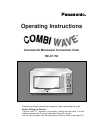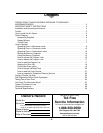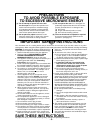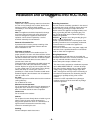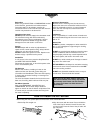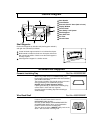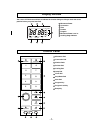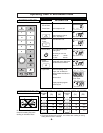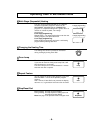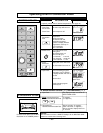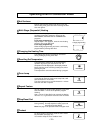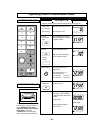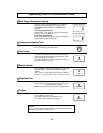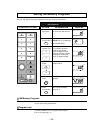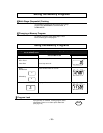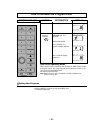
WARNING–To reduce the risk of burns, electric shock, fire,
injury to persons, or exposure to excessive microwave energy:
1. Read all instructions before using the appliance.
2. Read and follow “PRECAUTIONS TO AVOID
POSSIBLE EXPOSURE TO EXCESSIVE
MICROWAVE ENERGY,” above on this page.
3. This appliance must be grounded. Connect only to a
properly grounded outlet. See “Grounding
Instructions” found on page 4.
4. Install or locate this appliance only in accordance with
the provided installation instructions, found on page 4.
5. Do not cover or block any openings on this appliance.
6. Do not store or use this appliance outdoors. Do not
use this product near water for example, near a
kitchen sink, in a wet basement, or near a
swimming pool, and the like.
7. Use this appliance only for its intended use as
described in this manual. DO NOT use corrosive
chemicals, vapors, or non-food products in this
appliance. This type of oven is specifically designed
to heat or cook. It is not designed for industrial or
laboratory use. The use of corrosive chemicals in
heating or cleaning will damage the appliance and
may result in radiation leaks.
8. When cleaning surfaces of door and oven that
come together on closing the door, use only mild,
non-abrasive soaps or detergents applied with a
sponge or soft cloth.
9. Do not allow children to use this appliance, unless
closely supervised by an adult.
10. Do not operate this appliance if it has a damaged
cord or plug, if it is not working properly, or if it has
been damaged or dropped.
11. Do not immerse cord or plug in water.
12. Keep cord away from heated surfaces.
13. Do not let cord hang over edge of table or counter.
14. This appliance should be serviced only by qualified
service personnel. Contact the nearest authorized
service facility for examination, repair or adjustment.
15. Some products such as whole eggs, narrow neck
bottles and sealed containers - for example, closed
glass jars - may explode and should not be heated
in this oven.
16. To reduce the risk of fire in the oven cavity:
(a) Do not overcook food. Carefully attend appliance
if paper, plastic, or other combustible materials
are placed inside the oven to facilitate cooking.
(b) Remove wire twist-ties from paper or plastic bags
before placing bag in oven.
(c) If materials inside the oven should ignite,
keep oven door closed, turn oven off, and
disconnect the power cord, or shut off power
at the fuse or circuit breaker panel.
(d) Do not use the cavity for storage purposes.
Do not leave paper products, cooking utensils, or
food in the cavity when not in use.
17. Liquids, such as water, coffee, or tea are able to be
overheated beyond the boiling point without
appearing to be boiling due to surface tension of the
liquid. Visible bubbling or boiling when the container
is removed from the microwave oven is not always
present. THIS COULD RESULT IN VERY HOT
LIQUIDS SUDDENLY BOILING OVER WHEN A
SPOON OR OTHER UTENSIL IS INSERTED INTO
THE LIQUID. To reduce the risk of injury to persons:
(a) Do not overheat the liquid.
(b) Stir the liquid both before and halfway through
heating it.
(c) Do not use straight-sided containers with narrow
necks.
(d) After heating, allow the container to stand in the
microwave oven for a short time before removing
the container.
(e) Use extreme care when inserting a spoon or
other utensil into the container.
18. The outside of microwave oven becomes very hot
when the convection and combination stages are
being used. With the exception of the door handle
and control panel, DO NOT touch the outside
surface of the microwave oven, including the front
door, while the convection and combination stages
are being used.
SAVE THESE INSTRUCTIONS
For proper use of your oven read remaining safety cautions and operating instructions.
Your microwave oven is a cooking device and you should use as much care as you use with a stove or any other
cooking device. When using this electric appliance, basic safety precautions should be followed, including the following:
IMPORTANT SAFETY INSTRUCTIONS
- 3 -
PRECAUTIONS
TO AVOID POSSIBLE EXPOSURE
TO EXCESSIVE MICROWAVE ENERGY
(a) Do not attempt to operate this oven with
the door open since open-door operation can
result in harmful exposure to microwave energy.
It is important not to defeat or tamper with the
safety interlocks. Under normal conditions, the
oven will not operate with the door open.
(b) Do not place any object between the oven
front face and the door, or allow soil or cleaner
residue to accumulate on sealing surfaces.
(c) Do not operate the oven if it is damaged. It is
particularly important that the oven door closes
properly and that there is no damage to the :
(1) door (bent)
(2) hinges and latches (broken or loose)
(3) door seals and sealing surfaces.
(d) The oven should not be adjusted or repaired
by anyone except properly qualified service
personnel. (See page 2.)



